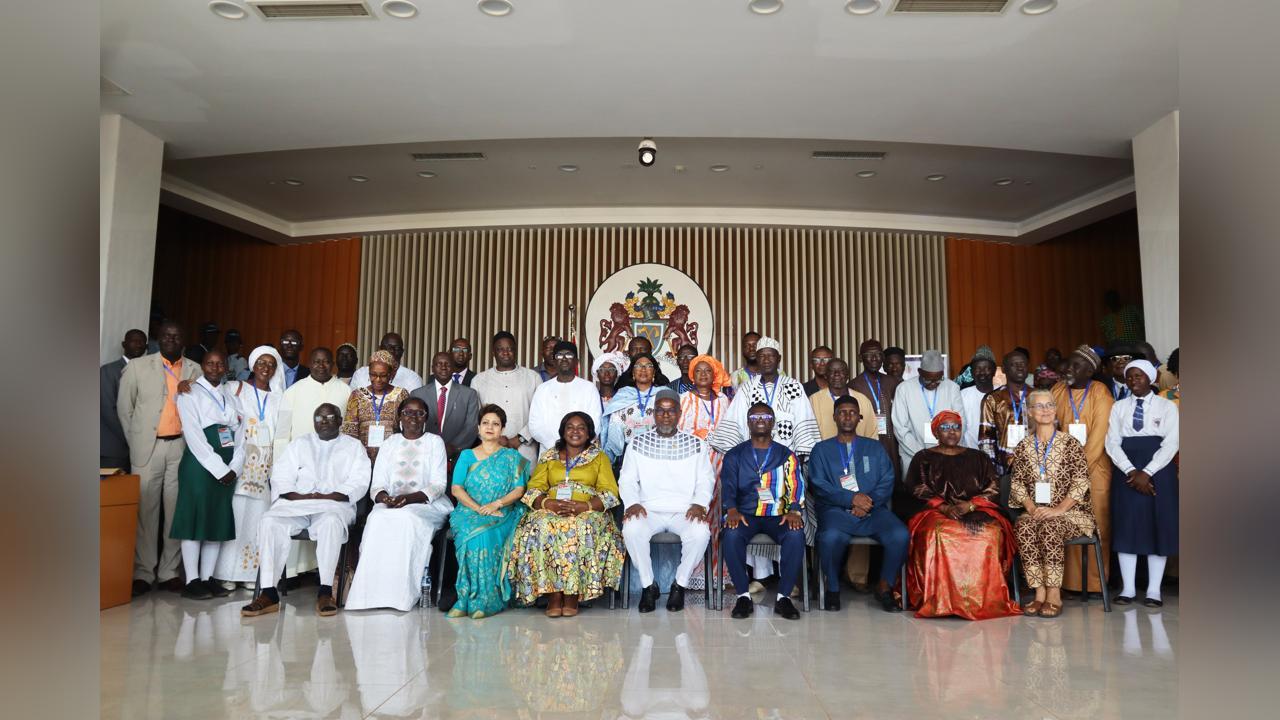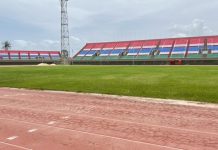Africa-Press – Gambia. The National Assembly of The Gambia is currently hosting the 54th Commonwealth Parliamentary Association (CPA) Africa Regional Conference for the first time. It is indeed an achievement for the Assembly since the Gambia became a member in 1965. Established in 1911 (originally as the Empire Parliamentary Association), it was renamed in 1948 to reflect the Commonwealth’s evolution from a colonial structure to a voluntary association of independent and equal states. The conference is taking place at a time when The Gambia is at a political crossroads since ousting a brutal dictatorship nine years ago, with a president seeking a third term. The theme of the conference is ‘Strengthening Democratic Governance and Resilience in Africa: Tackling Conflicts, Economic Shocks, and Climate Risks.’
The CPA Africa Region is the largest in the Commonwealth, comprising 63 national and sub-national legislatures, each with varying levels of democratic governance. It serves as a platform for African parliamentarians to share best practices, address regional challenges, and strengthen democratic institutions. While some countries have made significant progress, others face challenges such as executive dominance, electoral disputes, corruption, and restrictions on civil liberties. The conference aims to foster inter-parliamentary dialogue and share best practices, strengthen the role of legislatures in promoting democratic governance and resilience, as well as address critical issues such as governance, economic recovery, climate action, inclusive development, and digital innovation.
Within CPA Africa, one can notice democratic strengths in countries such as Ghana which is considered a model of stability, with peaceful transfers of power since 2000, and having strong judiciary and media freedom. In South Africa, there is a robust multiparty system. Botswana has been a long-standing democracy with minimal corruption. Mauritius enjoys a high democratic index and press freedom scores. Since Independence, Namibia enjoys political stability though SWAPO party has ruled since 1990. Seychelles is also noted to have improved after the 2020 elections, with the opposition now holding seats parliament.
Overall, one can point to positive trends where there are more competitive elections such as in The Gambia and Zambia in 2021 or Kenya in 2022. There is also a growing youth and women’s participation with Rwanda leading globally with 61% women in parliament. Judicial independence is also improving such as in Kenya where the courts overturned the results of the 2017 election as well as in Malawi whose courts annulled the 2019 polls or in The Gambia where the judiciary ruled in several cases against the government.
Notwithstanding, the region faces major democracy challenges. The incidence of executive overreach and weak legislatures are pervasive. In Uganda, Dictator Museveni (in power since 1986) suppresses the opposition while aided and abetted by a parliament that rubber-stamps executive decisions. In Rwanda, Dictator Paul Kagame has since 2000 won every election with over 90% as the opposition faces repression. Another Dictator Paul Biya leads in Cameroun which he has ruled for 38 years and in November is seeking an 8th term in office. The kingdom of Eswatini, Africa’s last absolute monarchy continues to violently suppress pro-democracy voices and protests.
The region also faces widespread electoral irregularities and violence such as in Nigeria where the 2023 presidential elections were marred by vote-buying, technical failures, and post-election lawsuits. It was almost the same scenario in Zimbabwe in the 2023 polls which were disputed as the opposition claims ZANU-PF manipulation. In Sierra Leone, there were internet shutdowns and arrests of opposition figures in the 2023 general elections.
Another major dent in democratic governance in the region is corruption and weak parliamentary oversight. For example, in Kenya, despite having strong institutions, grand corruption persists such as the KEMSA scandal involving the mismanagement and the loss of billions of shillings according to the Auditor General. In Malawi,The Gambia, or Mozambique, public sector corruption remains high which have implicated government officials despite reforms.
The CPA Africa Region is also beset by severe restrictions on the press, the opposition and civil society. In so many of these countries such as Tanzania, Gambia, Rwanda, Ghana or Uganda, journalists, activists, and opposition figures continue to face crackdowns. Strict draconian laws against civil and political freedoms remain which are being weaponised causing critics to face imprisonment or exile in some places. The recent Gen Z protests in Kenya, the END SARS protests in Nigeria and the Galamsey protests in Ghana had all witnessed massive human rights violations including arbitrary arrest, enforced disappearances, torture and summary executions. While democratic backsliding is noticed in many countries, others such as Uganda, Rwanda, Eswatini, and Cameroon remain in perpetual authoritarianism. Zimbabwe, Mozambique, Tanzania show limited democratic openings.
In the mix of this governance debacle, what has been the role of parliaments and their performance. Indeed, we could point to some strong oversight in Ghana, Kenya, and South Africa where parliaments there have rejected bad budgets and even impeached officials. But we could see also rubber-stamp legislatures in Uganda, Rwanda, Cameroon, and The Gambia. In terms of diversity and inclusion, there have been significant improvements in women and youth representation in many parliaments. Apart from Rwanda’s 61% women MPs, South Africa has 46% lead in gender parity. Though youth quotas exist in Kenya and Uganda, implementation is weak. Most of the other parliaments do not only lag behind but also have no quota system to promote inclusion.
While CPA Africa countries show economic potential and social progress, challenges like poverty, unemployment, and climate vulnerability persist. In 39 conflict-affected countries, most within CPA Africa, extreme poverty is rising sharply, with over 421 million people living on under $3/day, projected to increase to 435 million by 2030. Some nations spend more on debt servicing than on education, further compromising long-term human capital development and social progress. Stronger parliamentary oversight and regional cooperation are therefore critical to addressing these issues and fostering inclusive growth. CPA Africa faces an even more precarious situation given the scorched earth policies of an increasingly polarised and militarised geopolitics and emerging imperialist regimes in the US, China, Russia, and Europe.
In this regard, a pertinent issue that the conference should address is the role and position of the UK, Canada, Australia, and New Zealand in regard to the Global South. The UK benefits disproportionately from the Commonwealth given history. Slavery and colonialism in Africa hugely empowered and enriched the UK. If the Commonwealth is not to be viewed as the colonial tool of the UK, then CPA Africa Region must demand that the UK aligns itself with the interests of Africa. For example, CPA Africa should demand the democratisation of the UN and the entire internal system to ensure Africa’s place and voice, fair international trade, protection of African interests, accountability for climate change and the liberation of Palestine, among others. These are issues that CPA Africa must demand that the UK, Canada, Australia, and New Zealand to not only support African beyond what they provide within the framework of the Commonwealth, but also refrain from policies and actions they are pursing which are animal to African interests.
Given the above, I hope the conference will come up with strong recommendations to seriously improve democratic governance in the CPA Africa Region not only to address the dire socioeconomic conditions but also as bulwark against external forces. When democratic governance prevails strongly in this region it will automatically influence and improve democratic governance in all of Africa hence serve to also enhance the continent’s standing in the comity of nations. To strengthen democratic governance, legislative effectiveness, and accountability across the region, the CPA Africa Regional Conference should consider the following actionable recommendations.
First, I expect recommendations on strengthening parliamentary oversight and accountability, especially to enhance public accounts committees (PACs). This should include training MPs on forensic auditing and corruption investigations, as well as establishing joint PACs with civil society for greater transparency and accountability. Parliaments themselves should adopt robust open parliament initiatives such as pushing for live-streaming parliamentary sessions and public access to voting records. Parliaments also need to create citizen feedback mechanisms to enable the electorate track and monitor their representatives to ensure performance and delivery.
A key recommendation is legislative independence from the Executive. This means to recommend parliamentary budget autonomy to reduce executive control. There is also the need to encourage private member’s bills to diversify lawmaking beyond government agendas. In some parliaments where the Executive determine the tenure of Speaker and Deputy Speaker, such as the Gambia’s National Assembly, parliamentary independence and oversight are weakened. For this reason, the conference should set a standard that prevents the Executive from determining tenure and appointment of parliamentary leaders.
On the issue of elections, there is a need for reforms to strengthen democratic consolidation. In this regard, there is need for promoting election observation and therefore the establishment of standardised election observation protocols. CPA Africa should develop a regional election observation charter to ensure consistency and standards. It is also important to train MPs to monitor party primaries where lot of manipulation occurs.
The conference should also look into and promote opposition rights to ensure fair and level playing field to ensure quality multiparty system which is necessary for good governance. This would require guaranteeing equal media access for opposition parties before, during and after elections. Furthermore, there is need to establish funding equity rules for political parties to prevent abuse of incumbency and limit the use of money in elections. For this reason, fees for party registration and candidate nomination should be reasonably determined in such a way that no one is denied on one hand while on the other hand others are enabled to buy elections hence undermine democracy and governance.
Other areas worthy of consideration are recommendations to combat electoral violence and disinformation, strengthening diversity and inclusion, promoting anti-corruption and fiscal transparency including creating whistleblower protection laws. In this drive, there is need to set the standard for mandatory and publicly accessible asset declarations for all legislators including introducing lifestyle audits for suspicious wealth accumulation by MPs. Finally, parliamentary processes should be modernised by adopting e-voting systems, and the use of AI in bill drafting and policy analysis.
In conclusion, I hope both the CPA Africa Region and the National Assembly will ensure post-conference accountability. This will entail first adopting a ‘Banjul Implementation Framework’ in which there will be progress reports annually and published on a dashboard. In this regard, both CPA Africa and the National Assembly should be engaging with civil society and the media to monitor conference commitments.
CPA and the Africa Region as well as the host and all member parliaments should recognise that huge amounts of public resources are spent on parliament. The role of the parliament is to ensure that there is transparent and accountable governance that is producing sustainable development in which citizens enjoy their full rights. Unfortunately, since Independence African countries have not enjoyed the full benefits of their parliaments. In more cases than not, these parliaments have been accomplices in creating and entrenching dictatorships and enabling corruption and abuse of power to prevail.
The current global geopolitics and the state of affairs in the Africa Region require that CPA Africa Region and their parliaments take a self-assessment. This conference should serve as a turnaround, realising that business cannot continue as usual. Our parliament must fulfill their duty to produce democratic governance and accountable leadership that create and protect peace and justice and produce sustainable development and shared prosperity for all.
For More News And Analysis About Gambia Follow Africa-Press






